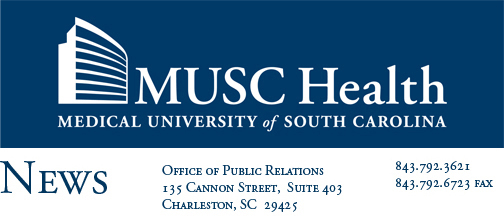

June 20, 2011
CHARLESTON– The Medical University of South Carolina (MUSC) has been selected to participate in a pivotal clinical study to evaluate the safety and effectiveness of a new therapy for patients with moderate to severe obstructive sleep apnea (OSA). The STAR trial will be conducted at leading medical centers across the United States and Europe, and will evaluate the efficacy of an implantable therapy that works with the body's natural physiology to prevent airway obstruction during sleep.
Current treatment options for OSA include weight loss, continuous positive air pressure (CPA), oral appliances, and surgeries. CPAP applied through a nasal mask is the current standard of treatment for OSA. However several recent studies show that CPAP compliance can be as low as 50 percent because of the nasal mask constriction, discomfort and inconvenience.
To be eligible for screening and inclusion in the STAR trial, patients must:
• Have failed or not tolerated CPAP
• Have moderate to severe obstructive sleep apnea
• Have a body mass index of less than 32
"Studies have shown that sleep apnea is as prevalent as adult diabetes and asthma, and the consequences of OSA range from disruptive to life-threatening," said M. Boyd Gillespie, MD, Associate Professor in the Department of Otolaryngology - Head and Neck Surgery, MUSC College of Medicine. "While CPAP can be very effective to treat OSA, for many patients it is simply too difficult to comply with, and thus ineffective."
More than 18 million Americans suffer from OSA, which is characterized by repeated episodes of upper airway collapse during sleep. Patients with OSA stop breathing frequently during sleep, often for a minute or longer. Daytime sleepiness, depression, weight gain, increase in industrial accidents and diminished quality of life are all commonly observed in people who suffer from OSA as a result of fragmented sleep patterns. Furthermore, OSA is associated with the development of systemic hypertension, cardiovascular diseases, stroke, and diabetes.
Those who suffer from OSA who would like to receive more information about enrolling in the STAR trial should contact 1-888-228-1396, or visit www.theSTARtrial.com.
About MUSC
Founded in 1824 in Charleston, The Medical University of South Carolina is the oldest medical school in the South. Today, MUSC continues the tradition of excellence in education, research, and patient care. MUSC educates and trains more than 3,000 students and residents, and has nearly 11,000 employees, including 1,500 faculty members. As the largest non-federal employer in Charleston, the university and its affiliates have collective annual budgets in excess of $1.6 billion. MUSC operates a 750-bed medical center, which includes a nationally recognized Children's Hospital and a leading Institute of Psychiatry. For more information on academic information or clinical services, visit www.musc.edu or www.muschealth.com.
About Inspire TM Upper Airway Stimulation (UAS) Therapy
Inspire Upper Airway Stimulation (UAS) therapy is a dynamic, implantable therapy that works with the body's natural physiology to prevent airway obstruction during sleep. While the OSA patient sleeps, Inspire therapy is designed to deliver physiologically timed, mild stimulation to the hypoglossal nerve on each breathing cycle. The stimulation is intended to restore tone to the muscles that control the base of tongue, preventing the tongue from collapsing and obstructing the airway. Patients control when the therapy is turned on and off via a handheld programmer. In contrast to other surgical procedures to treat sleep apnea, Inspire therapy does not require removing or permanently altering an OSA patient’s facial or airway anatomy.
For more information,visit http://inspiresleep.com/patient-experiences.php
#####